
For a city as coffee-obsessed as Seattle, there is a disappointing lack of high-quality coffee shop listicles. Most of them are Business Insider-style corporate slop, but even the better ones manage to be both too prescriptive and not prescriptive enough. They hesitate to make clear recommendations while also assuming that people want the same things out of a coffee shop. I can’t find the equivalent of a
anywhere!My taste in coffee is not quite as discerning as the average Seattleite, so I’m not sure how fit I am for the job. I tend to select more for vibes and atmosphere. But I have been to a lot of Seattle coffee shops. Given what’s out there, I feel qualified to at least offer a starting point for further exploration.
Below I have sorted seventeen Capitol Hill coffee shops into three major categories:
Second Wave Pioneers (7)
Modern Coffee Innovators (4)
Friendly Neighborhood Cafés (7)
Within each category, I will be using different evaluation criteria to pick the best coffee shop. Every listing will include the year of opening in Capitol Hill, the year of opening for the overall business (if different), and the location1.
Let’s get started!
I: Second Wave Pioneers (6)
This category covers coffee shops that:
roast their own beans
date back as a business to 2000 or before
have been around long enough to develop some name recognition in Seattle
I’m primarily evaluating this coffee category on the basis of impact. How essential is this shop to the current coffee culture of Seattle? How much did they contribute? And of course, how good is their coffee?
You might expect Capitol Hill to dominate this category, but there are perhaps more landmark coffee shops in U-District, which is home to Cafe Allegro, Bulldog News, Herkimer, and the now-defunct Last Exit. Nevertheless, Capitol Hill boasts quite a few iconic coffee shops of its own.
Espresso Vivace (North Broadway) [1988]

Espresso Vivace is among the oldest coffee shops in Seattle. While it’s not quite as old as Starbucks or Cafe Allegro, it has left an outsized imprint on the worldwide coffee scene. The owner, David Schomer, has been widely credited with popularizing latte art in the United States and fine-tuning a wide variety of espresso techniques that are still being used today. In particular, he is known for applying scientific rigor to the historically intuitive process of preparing Italian coffee.
I was expecting to be underwhelmed by Espresso Vivace after all of the hype, but I did really appreciate the coffee’s distinctive nutty flavor. It was impressively crowded on the rainy day that I went, and you could definitely feel the energy in the room. The ordering situation was kind of hectic and confusing, but I had a nice conversation with the barista about FKA twigs. So it still holds up all these years later!
WHAT TO ORDER: If you’re looking to explore beyond your standard espresso drink, consider ordering their signature Caffè Nico. It’s a small espresso drink infused with vanilla, cinnamon, half-and-half, and citrus.
Victrola (North 15th & West Pike/Pine) [2000]
Compared to Espresso Vivace and Starbucks, Victrola has more of a neighborhood hangout vibe. It’s the sort of place you might go with a friend on a weekend and hang out for a couple of hours. Time feels like it moves more slowly there. They also go for a vintage Jazz Age-influenced aesthetic— honestly I’m not sure how much it comes through, but I appreciate the effort!
Perhaps the most noticeable aspect of Victrola is its wall art, which is always created by local artists. You get the sense that it has a lot of regulars and it is really connected to its community. Every Victrola feels quite different from the others, and I see this as a result of their neighborly focus.
There is actually a second Victrola called Victrola Showcase in West Pike/Pine. This Victrola has a more visible roastery, which I think hosts coffee demos and classes (but I was unable to find info about them). I had a nice conversation with the barista at this Victrola, so I have fond memories of it. She had some interesting coffee opinions.
I remember their coffee being quite good in both cases, but it didn’t leave an especially lasting impression on me.
WHAT TO ORDER: Victrola has a wide variety of single-origin batches, so I would probably get whatever shot of espresso is recommended at the time. You could have a fun time nerding out with the barista about the minutiae of various roasts.
Caffé Vita (East Pike/Pine) [2002:1995]
Caffé Vita is perhaps the most recognizable non-Starbucks coffee shop in Seattle, providing coffee to a wide range of other cafés and local events. They are also known for their close relationship with KEXP, a beloved local radio station that hosts a Caffé Vita right next to their recording studio! The location in Capitol Hill very much has a “lock in” vibe: its relatively late hours and dim lighting attract lots of remote workers who are trying to get in their last few pull requests of the day.
It’s no surprise that Vita has such strong brand recognition; it’s really an institution in a way that most other coffee shops are not. Everything about the interior is curated to create a certain vibe, and it just kind of sucks you in. You really feel like you’re at a Caffé Vita and not anywhere else, if that makes sense. I would highly recommend it as a sort of aesthetic meeting spot, especially if you’re meeting out-of-towners.
But despite this, I have been quite underwhelmed by Caffé Vita’s drinks in the past. Some of this can be attributed to external factors: they supply so many other coffee shops in the area that you can start treating their coffee as a default, and their strong vibe always sets my expectations high. But I also have legitimate qualms with their coffee: their syrups in particular tend to be overly sweet and lacking in actual flavor. I wouldn’t say it’s bad, like their coffee is certainly better than your average coffee. But for a city like Seattle, I’m kind of surprised at the amount of love for Caffé Vita.
That being said, my opinion has moderated somewhat after trying their cortado. They provide a truly luxurious cortado experience: complete with a wooden tray and an accompanying glass of soda water. And perhaps this is just a result of the bells and whistles, but I found it to taste much better than any of their other drinks. So perhaps I will become a Caffé Vita fan yet!
WHAT TO ORDER: Definitely order their cortado. In my opinion, it’s head and shoulders above all of their other drinks.
Starbucks Reserve (West Pike/Pine) [2014:1971]
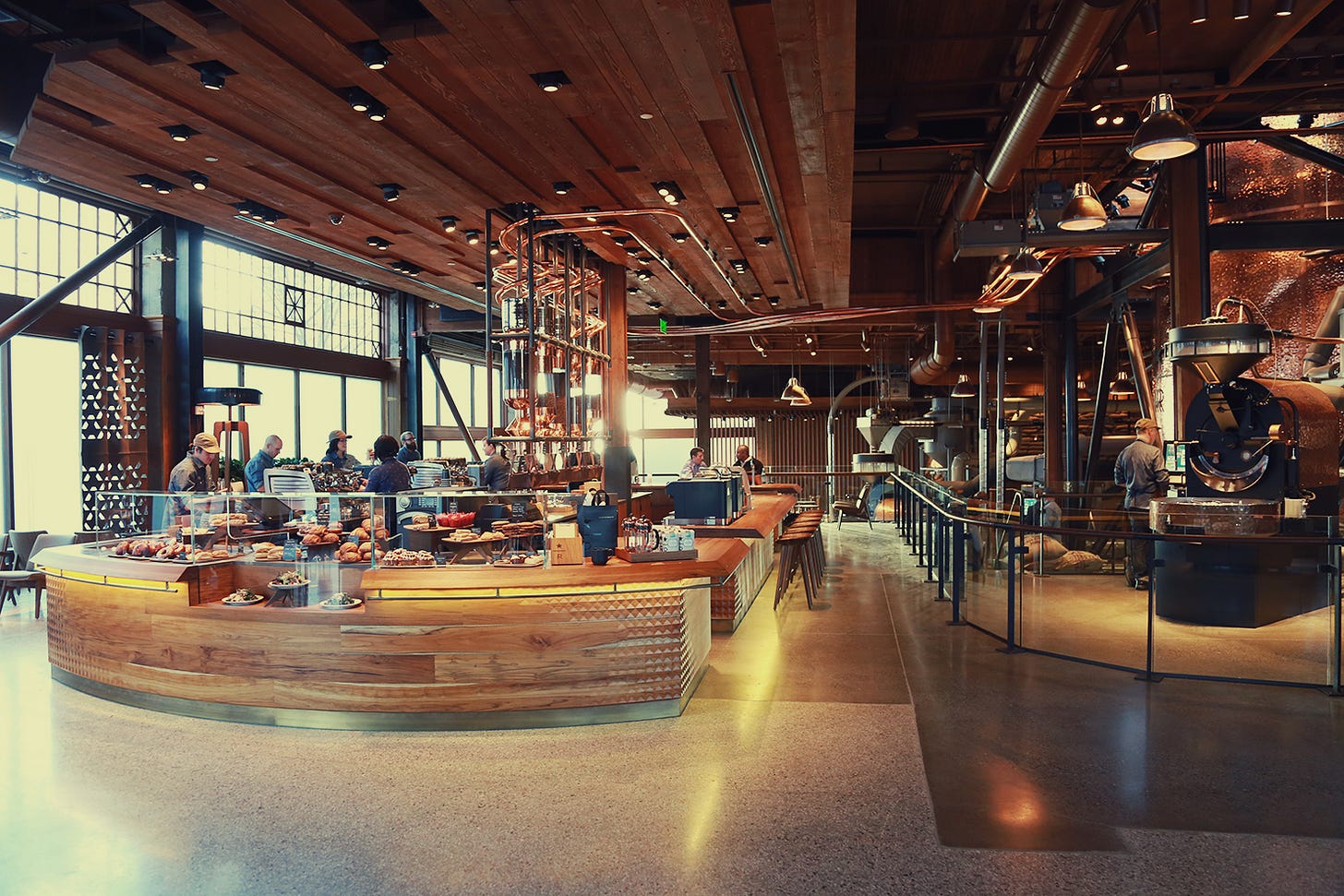
Say what you will about Starbucks, but the Starbucks Reserve in Capitol Hill is cool. It’s just such a spectacle— great for entertaining friends from out of town. You can scoff all you want, but the energy emanating from the global crowd of brand loyalists is infectious. And conveniently located next door is the underrated Melrose Market. It’s no Pike Place, but it is still quite cool in its own right.
I’ll say it: I feel very patriotic when I go to Starbucks. Most international food chains struggle to maintain standards of quality across a global network— ask any Taiwanese person about how much worse their favorite bubble tea tastes in the United States! But American brands like Starbucks have shown that it is possible to standardize a tasty product halfway across the world through the magic of supply chain logistics. It may taste a bit burnt, but it’s the same burnt tasted by millions around the world…
…their coffee still kind of sucks though. If you really want the Historical Seattle Coffee Experience, check out Cafe Allegro instead.
WHAT TO ORDER: It will likely be a long wait, but I would have to recommend their legitimately good espresso martini flight. It has interesting notes of fruit and spice that may win over even a Starbucks skeptic. (The coffee is legitimately better here.)
Caffe Ladro (North 15th) [2015:1994]
Caffe Ladro is the most understated of the big Seattle chains, with an exterior that very much blends into the background. While the Capitol Hill location is relatively new, Ladro is one of the older coffee shops in Seattle. Their logo is supposed to be a “coffee thief”, referencing their opening right next to a nearby Starbucks in the 90s to steal their customer base.
I really don’t have much to say about Caffe Ladro, but they are pretty good. I often hear them cited as a favorite coffee shop by locals. They also sell their own fresh pastries. There are quite a few Ladros distributed throughout the city, so that could also be a selling point.
WHAT TO ORDER: Caffe Ladro has pretty standout mochas, and in particular I would recommend their specialty orange chocolate drink called the Medici.
Bauhaus (North Broadway) [2019:1993]
Bauhaus is kind of a sad story. It was one of the earliest coffee shops in Capitol Hill, and it was perhaps the first to pioneer the coffee + books combo that is so beloved in Seattle today. But years of location instability has made it difficult for Bauhaus to preserve its distinct identity.
I didn’t love Bauhaus when I went; it felt rather sterile and didn’t have as much of a personality as I was expecting. (I don’t even think it had books.) The coffee also didn’t leave a strong impression on me. But I can understand the appeal of bringing back an iconic Seattle spot. When are they going to try to bring back Last Exit?
WHAT TO ORDER: Consider getting a cold brew to see if they live up to their name.
Kitanda (North Broadway) [2021:1998]
Kitanda is a bit of a weird fit for this section, since it doesn’t really scream Second Wave in the same way. The standard set of Brazilian milk drinks is a bit different, and the place feels more like the express version of a restaurant than a typical Seattle café. But it does come from the right time period, and they do roast their own beans! Plus, there are at least ten Kitandas across Washington, so it has some institutional weight.
Kitanda primarily advertises their açai bowls, which aren’t really my thing. But I can confirm that they serve amazing cassava bread that isn’t too heavy (as any decent Brazilian bakery should!). As for the coffee, it’s okay. They serve a unique single-origin blend. I want to say it’s a bit fruity compared to others, but don’t quote me on that. They don’t do cortados if you’re a cortado fan like me, but they will do a macchiato.
In any case, I wasn’t a huge fan of Kitanda. The café has a long layout with mostly white walls, which gives the inside a weird liminal quality. I also can’t say I was a huge fan of their style of milk drinks. But hey, how much can you really hate a coffee shop that serves such good cassava bread? And they’ve been able to survive for over 25 years, so people must be liking what they’re selling.
WINNER: Espresso Vivace
It’s hard to argue against Starbucks in terms of impact, but if anything, the current Seattle coffee culture is framed in opposition to Starbucks. Considering its history, knowledge, and pioneering espresso techniques, Espresso Vivace is the clear winner here. Go pay it a visit to get a taste of coffee history.
II: Modern Coffee Innovators (4)
This category is for more modern coffee shops that are trying to push the boundaries of gourmet coffee further. This is admittedly a less coherent category than the last one, but I think a line can still be drawn. Most coffee shops still outsource a lot more of their process, even in Seattle in 2025. And there’s a pretty clear age gap between the coffee shops founded in that early wave and the ones that are cropping up now.
Ghost Note (West Pike/Pine) [2017]

Ghost Note is really trying to cook. Or… roast. Whatever. They have a signature menu designed by the baristas that has such drinks as the Calypso (espresso, orange juice, pistachio-almond syrup, non-alcoholic rum, lime, Tiki bitters). Think of it as a fusion between a Seattle coffee shop and a fancy cocktail bar. Ghost Note also sources from several different roasteries and bakeries, so they have perhaps the widest variety of things you can order.
The main selling point of Ghost Note is definitely the baristas, and in particular the guy shown in this very image (Chris). They will be able to answer all your deepest coffee questions and design a drink that suits your fancy.
I honestly don’t love the actual vibe of Ghost Note. This is partially because I have gone at weird times when the place has been empty, but I think it would be a lot cooler if it looked more like Anchorhead. You get the cocktail bar experience, but it doesn’t exactly have the cocktail bar vibes.
I was most impressed by their chocolate flavor, which they take a lot of pride in. No Torani or Monin syrups are to be found here; rather, they source chocolate from real chocolate wholesalers. I ordered this drinking chocolate cocktail (coffeetail?) when I first visited, and it was really quite impressive. I would put it up there with the Chocolati Europa as one of my favorite chocolate drinks.
WHAT TO ORDER: Get a personalized recommendation. You should approach Ghost Note as you would a cocktail bar and not waste your visit ordering a normal drink. Talk it out with the barista and try to get a drink tailor-made for you. It’s part of the experience!
Anchorhead (East Pike/Pine) [2021:2016]
I quite like the whole nautical sailor aesthetic that they have going on. At first I was unimpressed with the layout of this particular location, but that was before I learned about its darkly-lit lower floor, which almost feels like a nightclub. Really cool space to visit. I think it would be a great late-night college hangout spot— too bad the place closes at 4:00 PM! They also have a cool space there for giving coffee demonstrations.
And their coffee is quite good. You don’t just have to take my word for it, because they started as a roastery only before expanding into a full café chain. So their coffee was able to sell quite well even outside of the café context!
WHAT TO ORDER: Anchorhead initially rose to prominence off of the strength of their cold brew, and the drink kind of just fits their vibe. It just feels like a place where you would order something cold, you know?
Wunderground (East Pike/Pine) [2021]
Wunderground is the most unique of the new wave of Seattle coffee places, as they infuse their coffee with actual mushrooms. This is supposed to give the coffee a wide array of health benefits, thanks to the “adaptogens” inside (whatever that means).
The place does have a sort of Bay Area startup aesthetic, but I don’t mind that. It is a very warm and inviting space with really cool wall art and good music. I do feel like it is designed for a few more people than the amount that it usually attracts. People come out on the weekends, but it’s been totally empty when I’ve gone on during the week. To be fair, I have still had a nice conversation or two.
My biggest qualm with this place is that they have very little in the way of real food for a health food place. It’s all just dessert— not even a plain croissant is to be found. Which I guess is par for the course for a coffee shop, but I just expected more.
Their coffee does taste pretty good. But the mushrooms certainly add a different taste, so you’ll have to judge for yourself.
WHAT TO ORDER: You should probably try out their pioneering Brain Wash Latte with oat milk. Do the adaptogens really boost your brain functions or is it all just a placebo effect? You’ll have to find out for yourself…
Seasmith (North Broadway) [2024]
Seasmith is the newest coffee shop in Capitol Hill, sitting at a prime spot right outside the light rail station. They pride themselves on their Seattle-inspired drinks. They’re part of the growing Burien Press empire (Fable All-Day, Moonshot). It’s a great place to go when you’re browsing the Capitol Hill farmers’ market.
I’ll admit that I don’t love Seasmith— it is super bright (I hate the sun) and mostly focuses on their flavored drinks (I hate sugar). But I like how their menu references various bits of Seattle culture. Since it is still very new, I will be curious to see how this place evolves in the future.
WHAT TO ORDER: Seasmith advertises their signature matcha latte, a favorite drink in Seattle. I’m not exactly sure what makes their matcha latte different, but you can find out for yourself.
WINNER: Ghost Note
In terms of capturing the spirit of the new wave of Seattle coffee, I think Ghost Note is the clear winner. The fusion of craft cocktails and espresso drinks just feels like a natural continuation of Seattle coffee culture, and they seem to have a strong sense of where things are headed. If nothing else, you’ll be able to learn a lot about coffee!
III: Friendly Neighborhood Cafés (5)
These coffee shops are more intimate: the kind where you chat up the barista and hang out on a lazy weekend. They don’t roast their own coffee, but that’s not really the point. You come for the vibes and the familiar faces.
These places will be evaluated more on vibes. Are they fun places to hang out? Do they have a good clientele? And rather than suggesting specific orders from these places, I will talk a bit about where their coffee comes from.
Café Argento (East Pike/Pine) [2004]
Argento is kind of an outlier both spatially and temporally. It’s out on its own little corner of East Pike/Pine, and there aren’t many cafes left from around the same time. Most coffee shops are from the 90s or the 2010s, not the mid-aughts. So it feels like sort of a bridge between the old wave of coffee shops and the current one.
Argento has some quirky decor, combining gay stuff with… Gustav Klimt paintings? They also have a lot of plants. It feels like a hybrid between a coffee shop and a casual lunch place, and it is in fact the only place among these to actually serve lunch. I would say the place is more known for its sandwiches than its coffee, although their coffee is pretty good as well.
I thought Argento was pretty good but nothing to write home about. It reminded me a lot of cafés in my suburban hometown of Oak Park. I would go there if you like plants.
WHAT THEY SERVE: Argento serves coffee from several different roasteries, most notably Vashon Island. I consider sourcing from multiple roasteries to be a major green flag: generally it means that the shop is more discerning!
Porchlight (East Pike/Pine) [2009]
Porchlight is a dual coffee shop / record store, which isn’t super common in Seattle, but it isn’t unheard of either. They have these vintage minimalist posters that create a sort of “European summer vacation” aesthetic. The space is bright, warm, and inviting.
Porchlight is perhaps the most relaxing coffee shop on this list. It opens a fair bit later than some of these other places, but somehow that feels on-brand for them. Optimal Porchlight conditions would be right after sleeping in on a lazy summer morning.
With all that being said, I wasn’t a huge fan of Porchlight. I didn’t love their coffee, and sunny relaxation is not really my vibe. But I’m sure someone else reading this would be a fan. I’ve talked to a couple baristas that really enjoy it.
WHAT THEY SERVE: Porchlight currently serves Herkimer, although I’ve heard that they have served different beans in the past. I honestly do not love Herkimer, but I know they have a lot of fans in Seattle.
Analog (Olive/Summit) [2011]
Analog is kind of like Argento in that it is tucked away in a more residential corner of Capitol Hill. It feels quite suburban compared to most other Capitol Hill coffee shops.
I actually really like the layout of Analog. The shop is split up into two halves: a front half where ordering happens and a back half with tables, and the bar / trash area is located in between. This is obviously a minor concern, but one of the most annoying café situations is when the people ordering and the people waiting and the people grabbing their lids all run into each other during peak hours. So the layout of Analog is super efficient, which is important considering how crowded this place gets!
But besides that, I don’t have much to say about Analog. They serve Macrina pastries and Herkimer coffee, which is a pretty default Seattle coffee shop combination. So… not exactly a place I’m particularly motivated to go back to. (But I will add that the coolest person I know preferred Analog out of all the Capitol Hill coffee places, so do with that information what you will.)
WHAT THEY SERVE: Analog currently serves Herkimer. As I mentioned before, I do not love Herkimer, but I know they have a lot of fans in Seattle.
Realfine (West Pike/Pine) [2015:2018]
Realfine is a friendly no-frills coffee shop in the heart of West Pike/Pine. It seemed to have a pretty large group of dedicated regulars compared to most coffee shops, and it was completely packed on a Friday. I don’t have a ton to say about the coffee itself— it was… fine? They did do the fancy-shmancy soda water cortado thing, but it didn’t have the luxurious presentation of Caffé Vita.
The highlight of my visit was probably the very hype music. I didn’t recognize any of the songs on their tracklist, but I kind of wish I did. There is also a collage of dog polaroids in the back (presumably from café regulars), if you’re into that sort of thing.
WHAT THEY SERVE: Realfine currently serves Herkimer. As I mentioned before, I do not love Herkimer, but I know they have a lot of fans in Seattle.
Overcast (East Pike/Pine & North 15th) [2020]
Last but not least, we have my regular spot Overcast Coffee. Considering that it’s my regular spot, it is surprisingly hard for me to think of specific notable things about it. It just has a great coffee and great energy. They also have pretty good non-Macrina pastries, as well as a Wunderground-esque mushroom drink called the Chagaccino.
I don’t know if this is intentional or not, but Overcast typically has two baristas at a time working who adopt a sort of “funny guy” / “straight man” dynamic. This can be pretty entertaining to observe, especially if some amusing customer gets involved.
Overcast is a pretty fun place to people-watch in general. Serendipity is one of the qualities I most value in a neighborhood coffee shop, and Overcast definitely delivers. Here are some things I have witnessed at Overcast:
An impromptu house music dance sesh
A dog eating my croissant (the owner bought me a new one)
One of the baristas dramatically running outside after a car
Extended conversations about the books Breasts and Eggs by Mieko Kawakami and Ball Lightning by Cixin Liu
Now of course this is partially a result of me going to Overcast way more than other coffee shops, but I do believe that Overcast has some inherent spontaneity to it. There is just always something going on.
Overcast has a second location next to the hospital on North 15th. That one is actually the original Overcast, and it’s more of a walk-up counter than a sit-down café. But you can get great coffee at either one, and the baristas are pretty much the same people.
WHAT THEY SERVE: Overcast serves coffee from several different roasteries, but they are currently serving This Coffee Life. I trust their judgment a lot here, so I’m happy to drink whatever they’re currently serving.
Bonito Café y Mercadito (Olive/Summit) [2023]
Bonito Café y Mercadito is a café and Mexican market just off the highway in West Capitol Hill. The place has lots of fun Mexican decorations and wares, with the goal of creating a sort of festive neighborly atmosphere. They also serve Rey Amargo chocolate (a hot chocolate café that closed in 2025, RIP), so you can go here if you want a taste of what Rey Amargo was like.
I think Bonito is… okay. I really admire their vision, and it is certainly one of the most unique coffee shops in the area. But their coffee is just kind of okay, and I don’t think they quite succeed in capturing the bustling market vibe that they’re going for.
I think the central problem is the location. Bonito is the sort of place that is just begging to be in some kind of town square, with market stalls spilling out into the street. But it can’t really achieve that vibe, since it’s right next to I-5. If it was instead located somewhere like El Centro, I think Bonito would be a lot more attractive.
That being said, their drink menu is very comprehensive, and they seem to have a great relationship with their regulars + community. I would definitely recommend getting a drink that showcases some of those Mexican spice blends.
WHAT THEY SERVE: Bonito currently serves Fulcrum. It’s a dark roast that I like depending on my mood.
VERDICT: Overcast
While I said I would avoid overly prescriptive statements, I will unequivocally say that Overcast Coffee is my favorite coffee shop in Capitol Hill. I think it has a great vibe as well as the best-tasting coffee. Like I said above, Overcast isn’t particularly innovative or distinctive, they just do the standard coffee experience really well. (And I suppose their coffee also stands out in a sea of Herkimer.)
Conclusion
So there you have it. Three unambiguous coffee recommendations: Espresso Vivace, Ghost Note, and Overcast, depending on your preferred niche. If you want to see more of this, please let me know! There are about twenty more coffee shops in Capitol Hill for which I have Thoughts and Opinions.
Edit: Now more coffee shop opinions to be found in Part 2
CAPITOL HILL COFFEE GUIDE: PART TWO
People responded pretty well to my last post, so I’ll jump right into Part 2. I don’t have quite as much say about these coffee since they are more obviously differentiated from each other, but there are also a lot more of them to cover!
Capitol Hill’s major commercial corridor is Pike/Pine, the corridor around Pike Street and Pine Street that contains most of the neighborhood’s nightlife. It is neatly bisected into East and West halves by Broadway Street. Other corridors include:
North Broadway: A nightlife district north of the Light Rail Station
Olive/Summit: A skinny corridor to the west that snakes past the highway and feeds into downtown
North 15th: A more suburban-feeling corridor to the northeast anchored around a shopping district and Ada’s Technical Books
North 19th: A smaller corridor even further to the northeast that is sometimes called Stevens or Miller Park
Seattle U: A small corridor just south of Seattle U campus




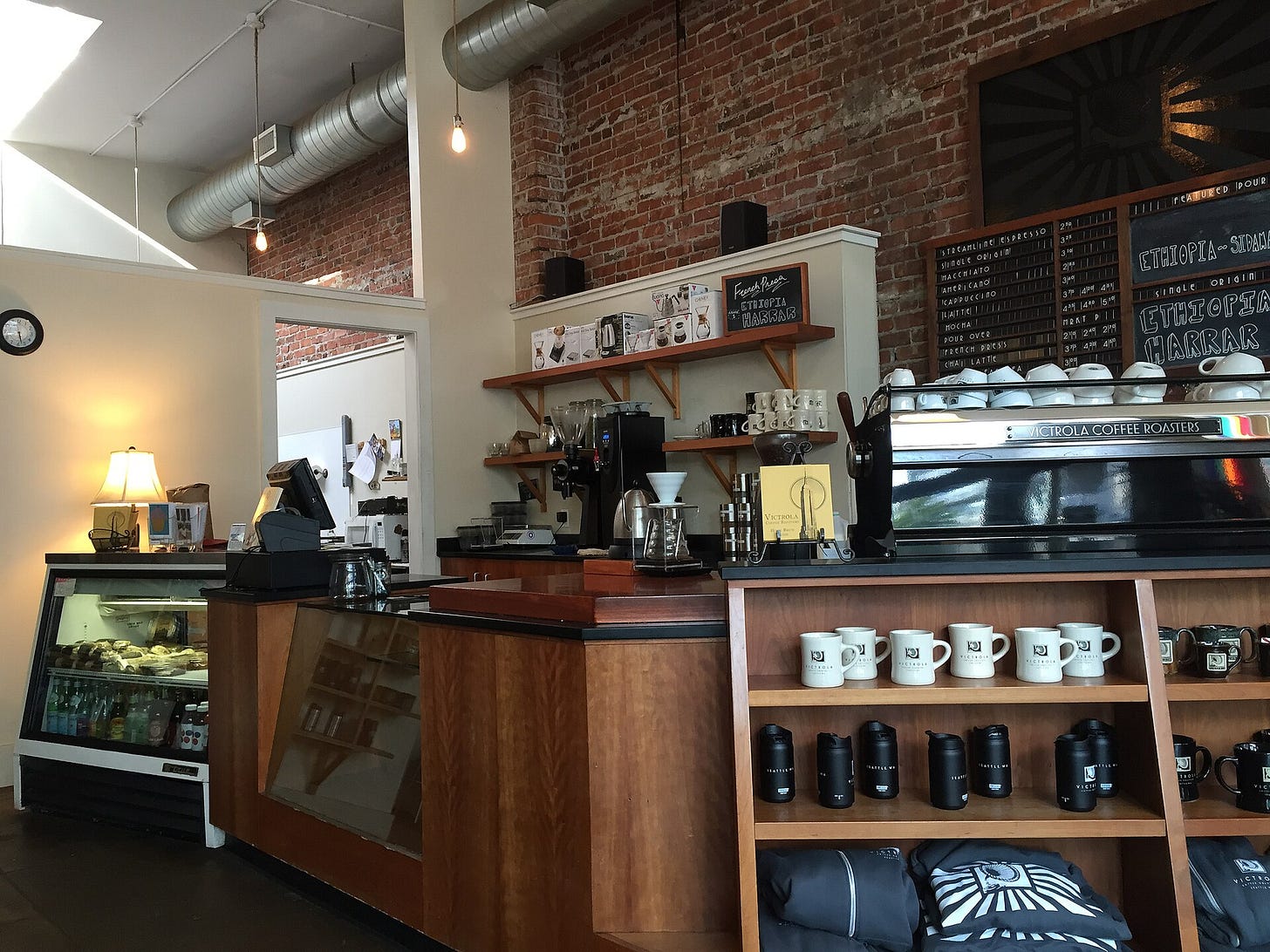
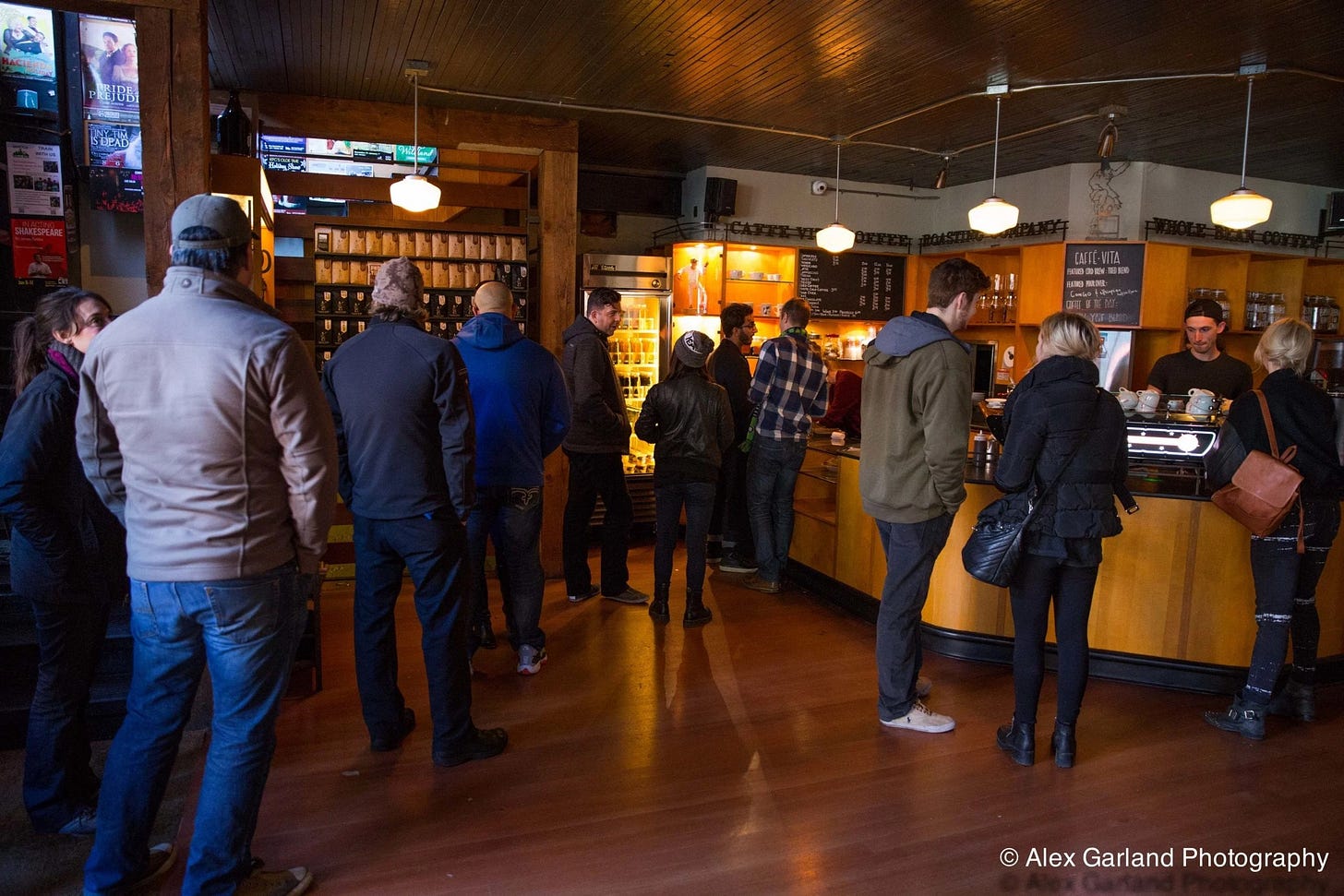
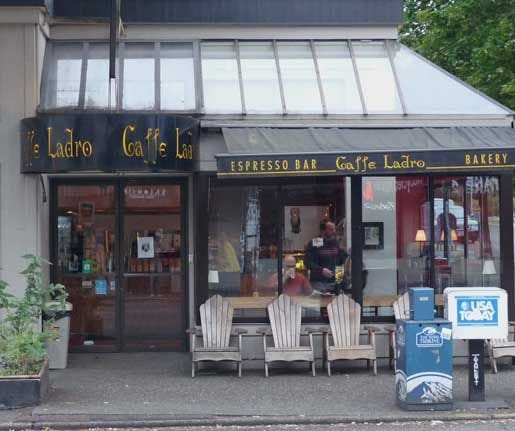
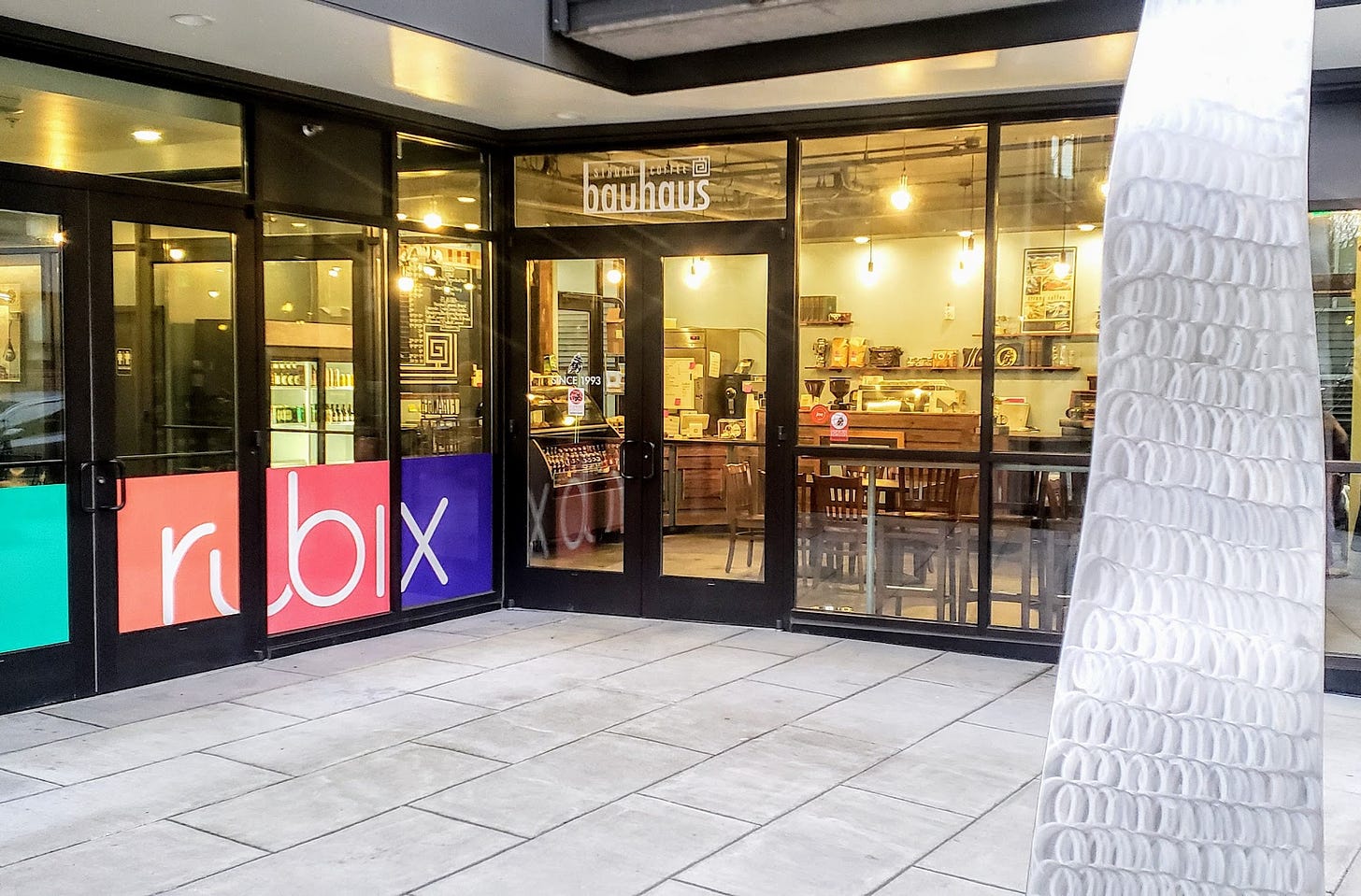

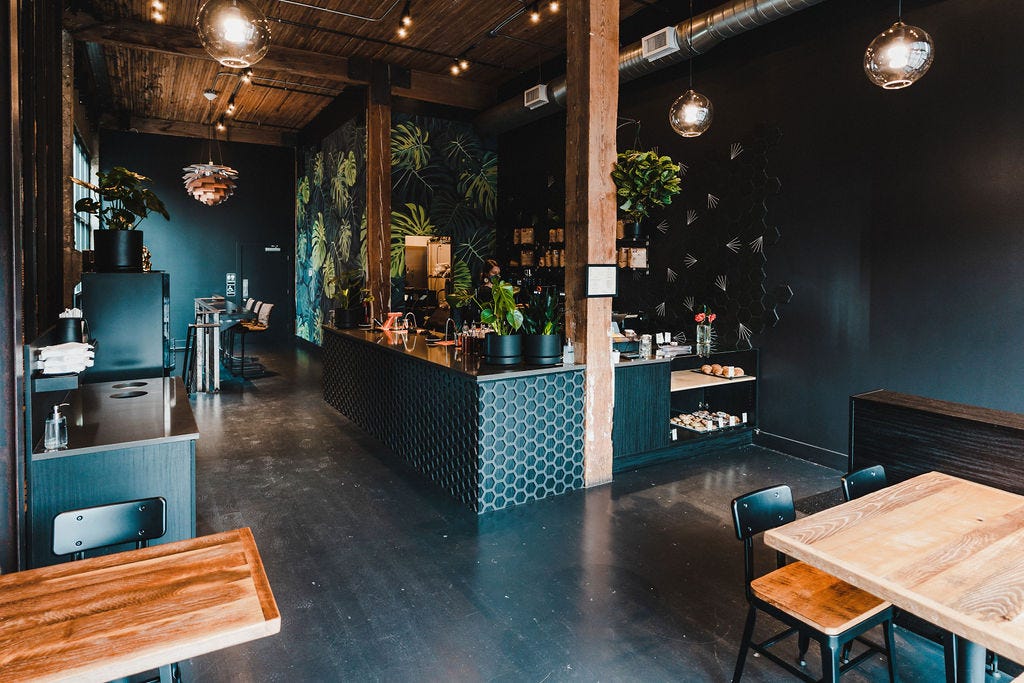
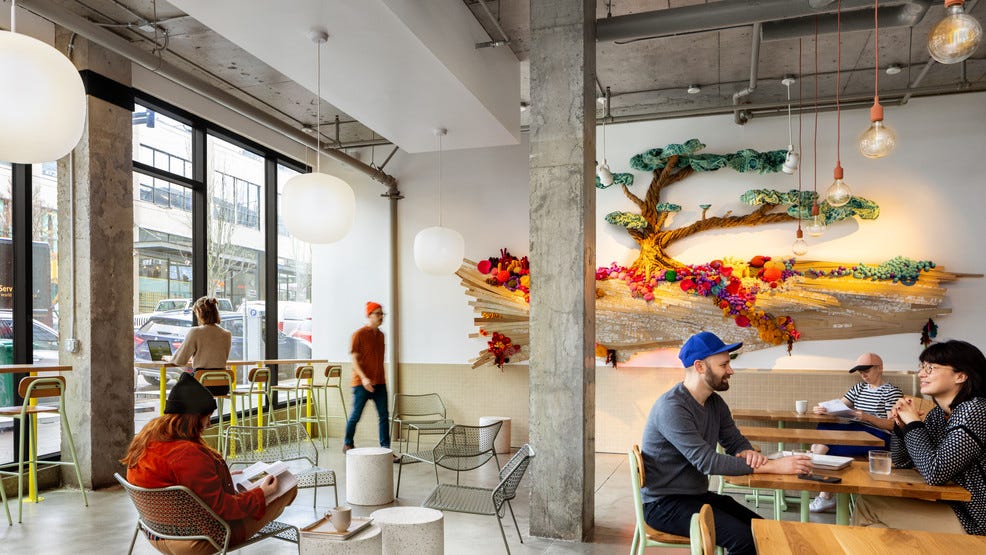
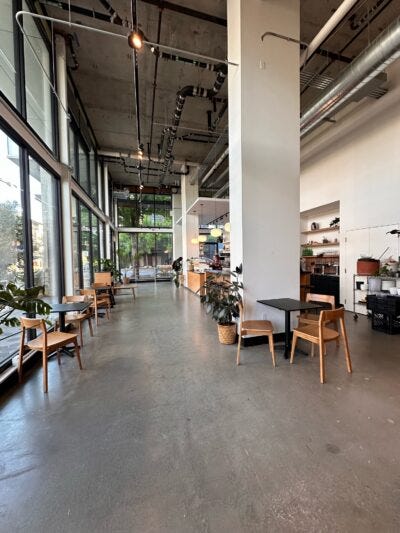

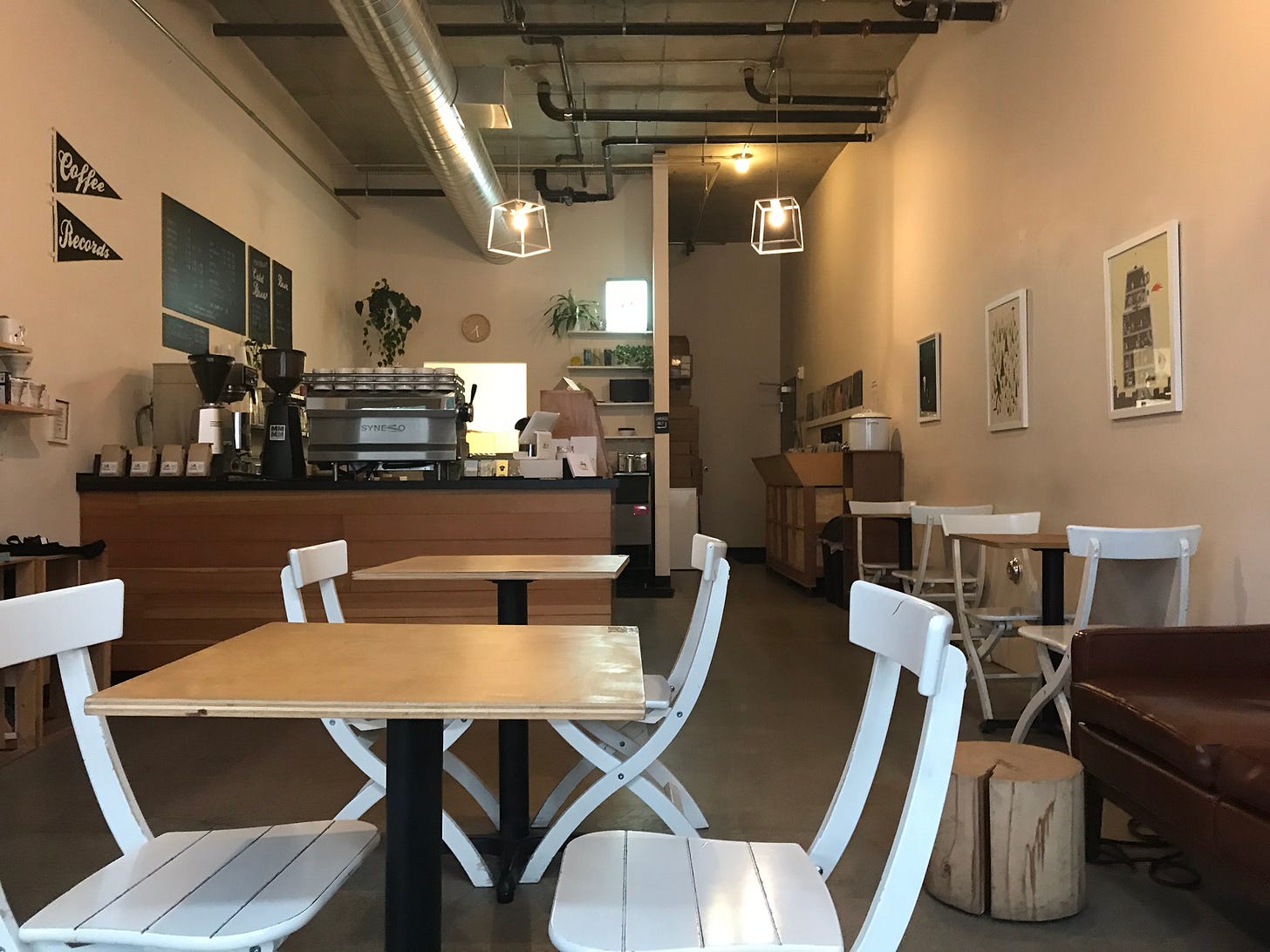



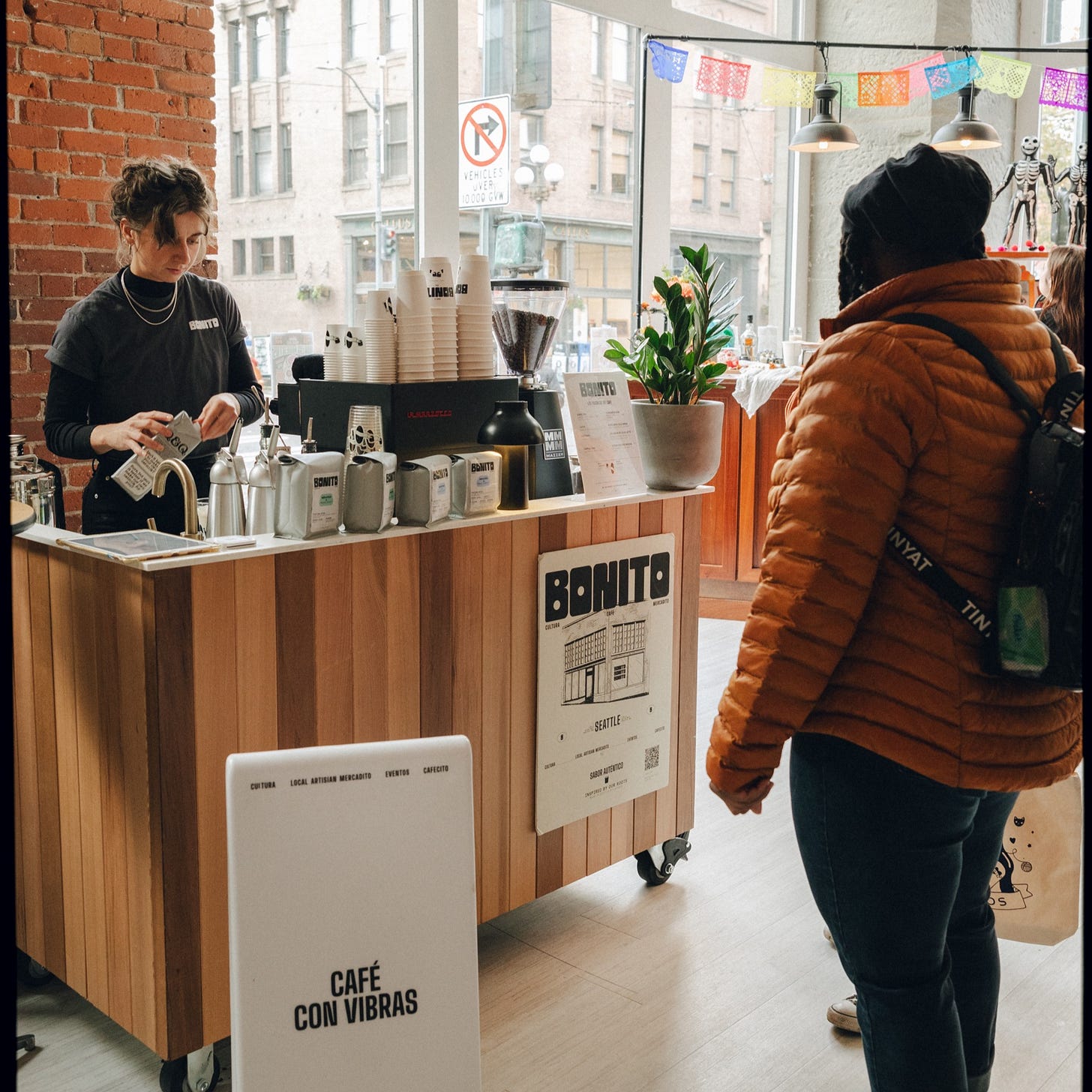
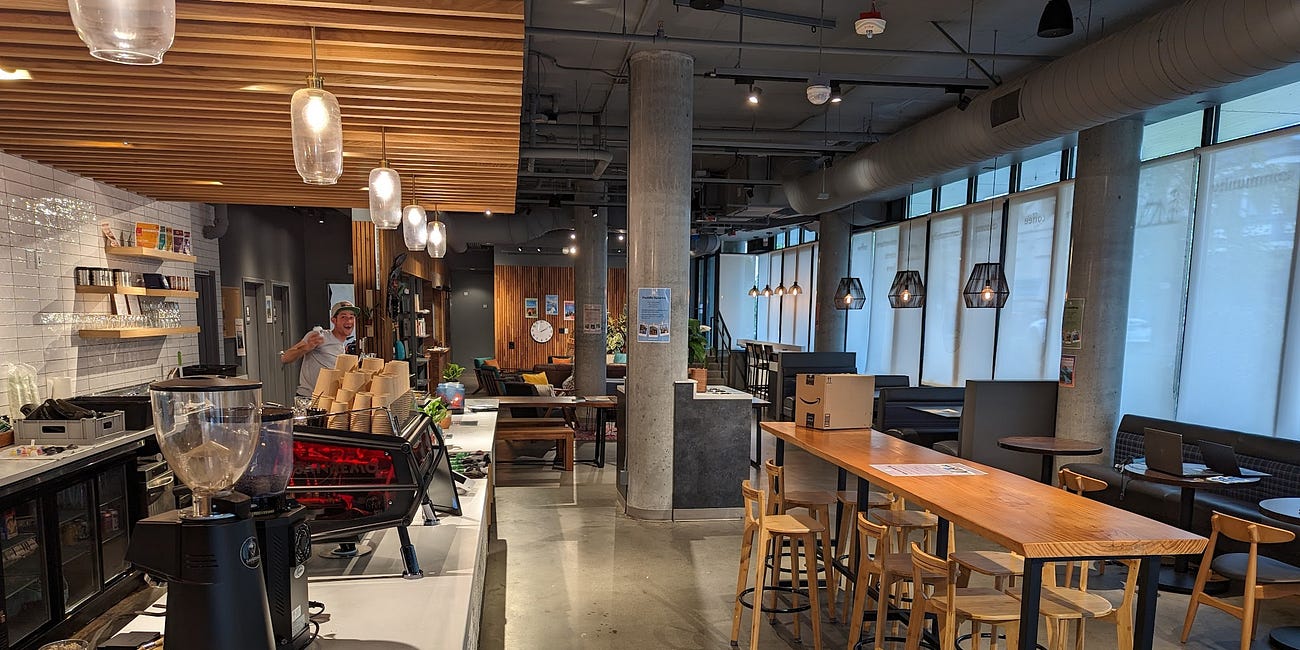
This is awesome, I'm definitely going to share this in my newsletter Seeking Seattle! I appreciate that you take vibe into account. It's such an important part of the experience!